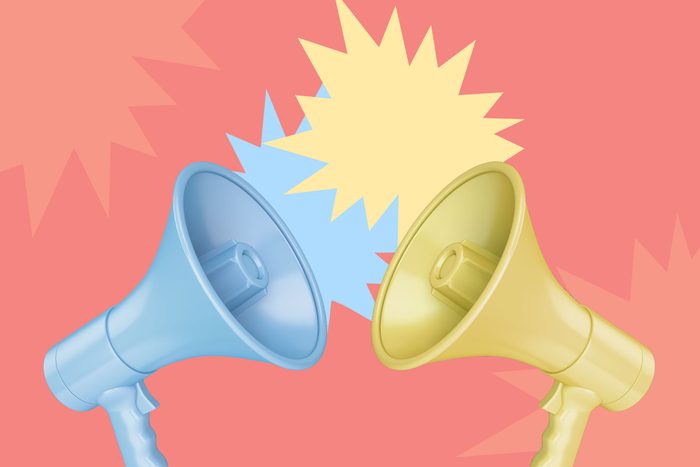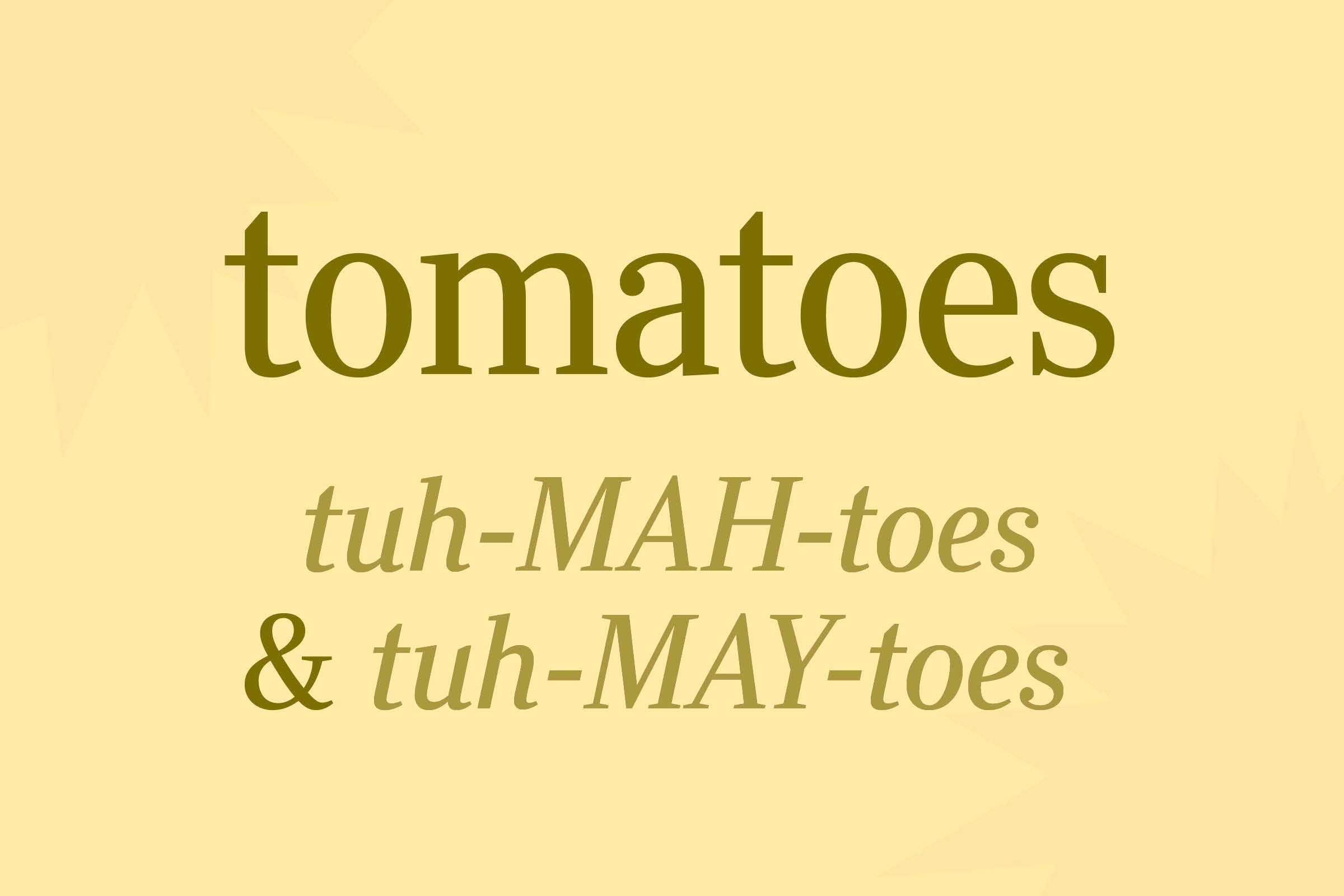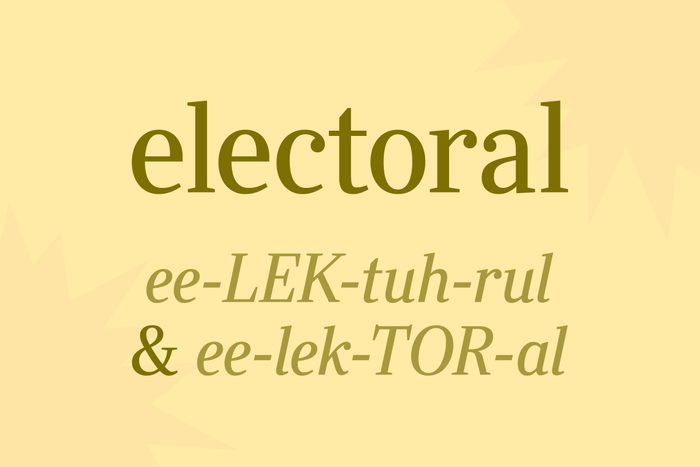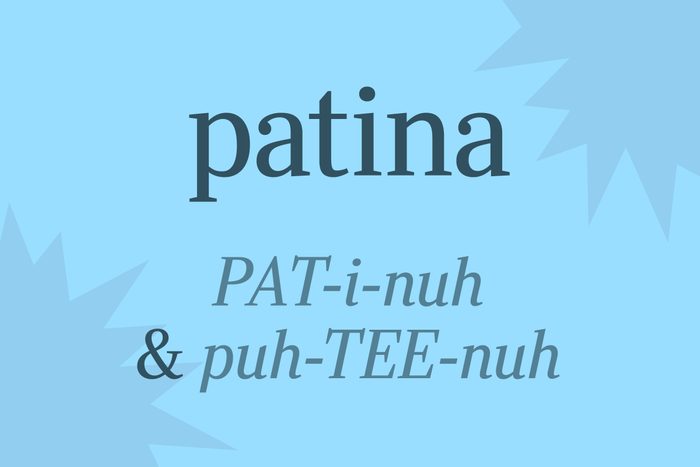Is it "leh-zhur" or "LEE-zhur"? "Tuh-MAH-toe" or "tuh-MAY-toe"? A language expert weighs in on the words people pronounce differently.

13 Words People Say Differently and How to Pronounce Them


Data
Pronunciations: DAY-tuh or DAH-tuh
Data, which is defined by Merriam-Webster as “factual information (such as measurements or statistics) used as a basis for reasoning, discussion or calculation,” can be pronounced as DAY-tuh or DAH-tuh.
Elster shares a general rule of English pronunciation: If the word comes directly from Latin (as data does) and the stressed syllable ends in a vowel, then the vowel should have its long English sound. Thus, data is pronounced DAY-tuh, not DAT-uh, because the stressed syllable is not closed (as dat-a) but rather open (as da-ta).

Vase
Pronunciations: VAYS, VAYZ or VAHZ
Vase is another classic example of words people say differently. Should one say VAYS (rhymes with lace), VAYZ (rhymes with haze) or VAHZ (rhymes with Oz)? In 1791’s Critical Pronouncing Dictionary, the famed English elocutionist John Walker declared VAHZ “too refined for the general ear,” Elster shares, although it remains the preferred British pronunciation. (A fourth variant, VAWZ, is also British and overrefined.)
“As an American speaker, you have to choose between VAYS and VAYZ,” Elster says. “The latter is venerable, but the former is the dominant pronunciation, used since the days of Noah Webster.”

Tomatoes
Pronunciations: tuh-MAH-toes or tuh-MAY-toes
“New Englanders will live free or die over this one. Like my mother, who hailed from Massachusetts, Yankees love their tuh-MAH-toes. The rest of us, however, love our tuh-MAY-toes,” Elster says. “The Yankees (and some Southerners) are on the wrong side of the Revolutionary War on this one, but the rest of us will forgive the transgression.”
In other words, the Yankee pronunciation can be tied to the British pronunciation, while most Americans accept the tuh-MAY-toes version.

Gala
Pronunciations: GAY-luh, GAL-uh or GAH-luh
Is it GAY-luh, GAL-uh or GAH-luh? As with data, there is a stressed syllable ending in a vowel, so the vowel sound should be long. Thus, GAY-luh has long been the preferred pronunciation. The other two variants have been recorded since roughly the 1930s. GAL-uh, though standard, is an American affectation, and GAH-luh is British.

Juror
Pronunciations: JOOR-or or JUR-ur
Lawyers and judges love to over-pronounce, Elster says, such as when they call a defendant a dee-FEN-dant, rhyming the last syllable with can’t. He also points to their strange penchant for pronouncing the unstressed suffix –or like “or” instead of “ur,” which is the way the rest of us say it. For jurists, a vendor isn’t a VEN-dur but a VEN-dor (as in door), and a juror has to be a JOOR-or rather than a JUR-ur. This is pure affectation, according to Elster.

Electoral
Pronunciations: ee-LEK-tuh-rul or ee-lek-TOR-al
“American speakers have developed an ‘oral’ problem, as yet unidentified by dentists, and it has caused a stress fracture in a number of words,” Elster jokes. So where do you put the stress in electoral, pastoral, pectoral and mayoral? If it’s on the OR-al sound, you have joined the fraternity of uncultivated speakers—which, if it makes you feel better, admits almost anyone, according to Elster.
That’s right, the correct pronunciation of electoral is ee-LEK-tuh-rul, not ee-lek-TOR-al. For about 30 years, the trendy OR-al variants have been overtaking the traditional pronunciations of these words: ee-LEK-tuh-rul, PAS-tuh-rul, PEK-tuh-rul and MAY-uh-rul. “I urge you to practice good oral hygiene and eschew these vogue pronunciations with the stress on –or,” Elster quips.

Clique
Pronunciations: click or KLEEK
Do you say this word, defined by Merriam-Webster as “a narrow exclusive circle or group of persons,” like click or rhyme it with the word sleek? Elster explains that since the 1970s, many Americans have pronounced it “click,” but the preferred pronunciation among cultivated speakers who know the French origin of the word remains KLEEK. He shares that it’s comparable to chic, which the uninformed pronounce CHIK and connoisseurs pronounce SHEEK.

Laboratory
Pronunciations: LAB-uh-ruh-tor-ee or luh-BOR-uh-tree
“This is a straightforward British-American pugipron,” shares Elster. “If you’re British, you stress the second syllable: luh-BOR-uh-tree. If you’re American, you stress the first syllable: LAB-uh-ruh-tor-ee.”
This is similar to other words that Brits pronounce differently, such as aluminum and vitamin. There’s even a difference in how we pronounce letters—Americans say ZEE, while Brits say ZED.

Mature
Pronunciations: muh-CHUUR, muh-CHOOR, muh-TUUR, muh-TOOR, muh-TYUUR or muh-TYOOR
“You can say muh-CHUUR (rhymes with ‘a fir’), muh-CHOOR (rhymes with ‘manure’), muh-TUUR (rhymes with ‘a fir’ again), muh-TOOR (rhymes with ‘I’m poor’) and muh-TYUUR or muh-TYOOR (which rhymes with ‘unsure,’ depending on how you pronounce that word, with –ur or –oor),” Elster rattles off. “The pronunciations with t were long preferred, and the ones with ch were long derided, but since at least the 1980s, the ch pronunciations have prevailed and been sanctioned by dictionaries and usage commentators.”
Ultimately, it’s best to stick with muh-CHUUR or muh-CHOOR.

Patina
Pronunciations: PAT-i-nuh or puh-TEE-nuh
Patina is another one of the long list of words people pronounce differently. To explain this puzzling pugipron, Elster poses a question: How do you pronounce stamina and retina? With the accent on the first or second syllable?
“These words, along with patina, come from Latin and all traditionally have their accent on the first syllable,” he says. “The sham-refined variant puh-TEE-nuh is a vogue pronunciation that arose in the 1950s and, unfortunately, is now probably the dominant American pronunciation.” So either pronunciation works, but it’s technically more correct to stress the first syllable, pronouncing it PAT-i-nuh.

Appalachia
Pronunciations: appa-LAY-sha or appa-LATCH-a
This large American region makes up a word that people say very differently, and your choice of pronunciation depends on where you’re from, according to Elster. “Are your speech influences from above or below the Mason-Dixon line? If you’ve been reared somewhere north or west of mid-Virginia, you’re likely to pronounce the third syllable like lay. If you hail from a place where okra is considered edible, your preference for that third syllable is almost certainly latch. The one thing we can agree on is that the –ch should be pronounced as in church and not with a pseudo-French –sh.”
In other words, Northerners and those from the West tend to pronounce it appa-LAY-sha, while those in the Southeast say appa-LATCH-a.

Leisure
Pronunciations: leh-zhur or LEE-zhur
Due to the difference in the British and American accents, leisure remains one of those classic words people pronounce very differently. Though the Brits and many Southerners rhyme this word with pleasure, Elster differs and prefers to rhyme it with seizure. “Even a lot of British commentators, along with Anglophilic American commentators, have given priority to LEE-zhur, and it is unquestionably the preferred American pronunciation,” he says.

Celtic
Pronunciations: kelt-ick or sell-tick
“If you pronounce this with a k sound for the c, you are imagining that you are affecting some kind of native pronunciation,” he says. But Celtic actually comes from Latin through French, and it came to English with the French s sound for the c. The widely popular reinstatement of the k sound for the c is actually just a resurrection of the classical Latin k for c and a nod to the archaic spelling Keltic. “Not that this argument will make a bit of difference,” he adds, tongue in cheek, “because these days, anything but a k in Celtic in any context (except for the Boston basketball team and a Glaswegian soccer club) will induce derision and perhaps violence.”
About the expert
|
Why trust us
At Reader’s Digest, we’re committed to producing high-quality content by writers with expertise and experience in their field in consultation with relevant, qualified experts. We rely on reputable primary sources, including government and professional organizations and academic institutions as well as our writers’ personal experiences where appropriate. We verify all facts and data, back them with credible sourcing and revisit them over time to ensure they remain accurate and up to date. Read more about our team, our contributors and our editorial policies.
Sources:
- Merriam-Webster: “Definition of data”
- Merriam-Webster: “Definition of clique”
- Charles Harrington Elster, editor of Black’s Law Dictionary, consultant for Garner’s Modern English Usage and author of What in the Word? and There’s a Word for It




















